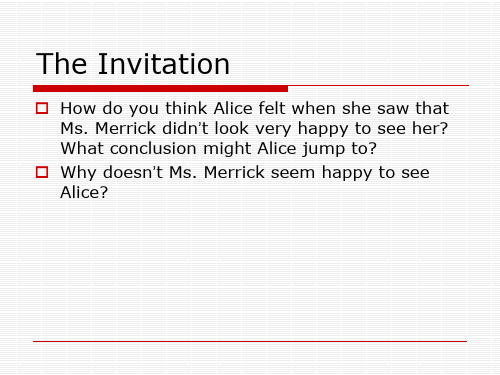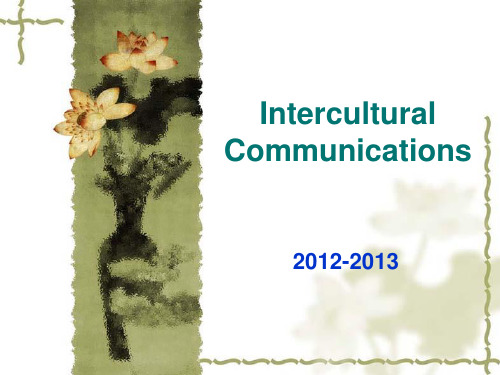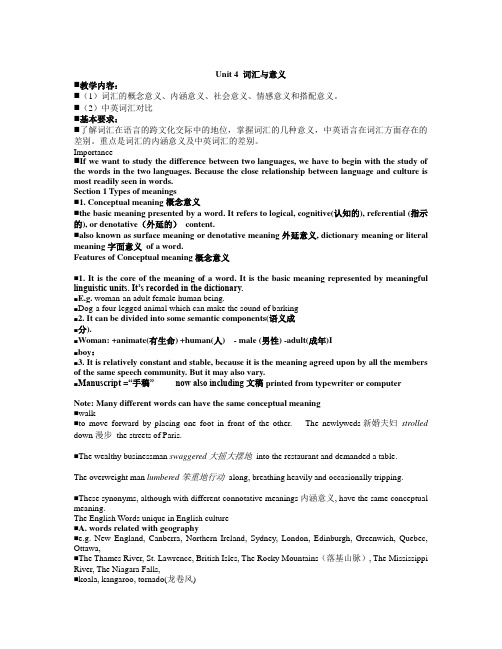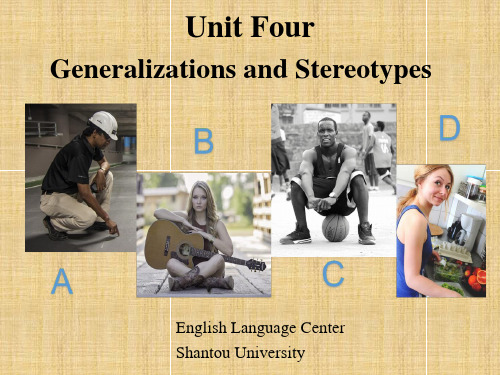跨文化交际Unit4
跨文化交际-Unit 4

Culture Shock
It is a feeling of being confused and overwhelmed by life in another culture. It is caused by the anxiety that results from losing all our familiar signs and symbols of social intercourse. These signs or cues include the thousand and one ways in which we orient ourselves to the situation of daily life: how to give orders, how to make purchases, when and where not to respond. Now these cues which may be words, gestures, facial expressions, customs, or norms are acquired by all of us in the course of growing up and are as much a part of our culture as the language we speak or the beliefs we accept. All of us depend for our peace of mind and efficiency on hundreds of these cues, most of which we are not consciously aware.
Causes of cultural shock
跨文化交际复习unit 4

because they act as if they’re your friends when they are
not.
Americans would consider it awkward to have a long
period of silence when having a conversation. They
conclude that Indians are sullen, uncooperative, even stupid.
-- What to say
E.G. A conversation between Susan and Mrs. Zhang, her mother in law, at the airport when leaving China. The husband is interpreting for them.
-- Pacing
and pausing
How fast do you speak?
How long do you wait following another
speaker’s utterance, before concluding the
other has no more to say?
I had a British friend who I thought never had anything to say (which was becoming rather annoying) until I learned that she was waiting for a pause to take her
Warm-up:Case study
Case 1 --- A fish in unfamiliar waters
跨文化交际实用教程Unit 4

Question: Could you give Roger an explanation?
7
Case 2. A Misunderstanding Caused by a Joke
Comment
The
problem resulted from the misunderstanding of the word “hustle”. In colloquial American English, there are at least two meanings for the word “hustle”. ---- to force sb to make a decision before they are ready or sure; -----to work as a prostitute /romance or sex is hinted.
5
Case 2. A Misunderstanding Caused by a Joke Background information
Roger, the Personnel Executive of a large American multinational firm, worked in Brazil to help promote business. Rosalita, a Brazilian woman Roger had known for some time. Roger generally had a very good impression of her and always felt at ease with her. One evening, they met at a party, attended by both Roger‟s employees from the United States and many Brazilian business people.
跨文化交际unit4解析

Unit 4 词汇与意义⏹教学内容:⏹(1)词汇的概念意义、内涵意义、社会意义、情感意义和搭配意义。
⏹(2)中英词汇对比⏹基本要求:⏹了解词汇在语言的跨文化交际中的地位,掌握词汇的几种意义,中英语言在词汇方面存在的差别。
重点是词汇的内涵意义及中英词汇的差别。
Importance⏹If we want to study the difference between two languages, we have to begin with the study of the words in the two languages. Because the close relationship between language and culture is most readily seen in words.Section 1 Types of meanings⏹1. Conceptual meaning概念意义⏹the basic meaning presented by a word. It refers to logical, cognitive(认知的), referential (指示的), or denotative(外延的)content.⏹also known as surface meaning or denotative meaning外延意义, dictionary meaning or literal meaning字面意义of a word.Features of Conceptual meaning概念意义⏹1. It is the core of the meaning of a word. It is the basic meaning represented by meaningful linguistic units. It’s recorded in the dictionary.⏹E.g. woman-an adult female human being.⏹Dog-a four-legged animal which can make the sound of barking⏹2. It can be divided into some semantic components(语义成⏹分).⏹Woman: +animate(有生命) +human(人) - male (男性) -adult(成年)I⏹boy:⏹3. It is relatively constant and stable, because it is the meaning agreed upon by all the members of the same speech community.But it may also vary.⏹Manuscript =“手稿” now also including文稿printed from typewriter or computer Note: Many different words can have the same conceptual meaning⏹walk⏹to move forward by placing one foot in front of the other. The newlyweds新婚夫妇strolled down漫步the streets of Paris.⏹The wealthy businessman swaggered大摇大摆地into the restaurant and demanded a table.The overweight man lumbered笨重地行动along, breathing heavily and occasionally tripping.⏹These synonyms, although with different connotative meanings内涵意义, have the same conceptual meaning.The English Words unique in English culture⏹A. words related with geography⏹e.g. New England, Canberra, Northern Ireland, Sydney, London, Edinburgh, Greenwich, Quebec, Ottawa,⏹The Thames River, St. Lawrence, British Isles, The Rocky Mountains(落基山脉), The Mississippi River, The Niagara Falls,⏹koala, kangaroo, tornado(龙卷风)⏹The Great Barrier Reef, Silicon Valley, Yellowstone Park,⏹Summary:All these have their own geographical features: places, plants and animals uniquely found in USA, Great Britain and Australia; They all represent meaning unique in their own cultures;Their Chinese equivalents are only used by the Chinese people as mere names, which have lost their distinctive geographical and cultural features.The English Words unique in English culture⏹A. words related with geography⏹e.g.⏹U.S.A: New England, The Rocky Mountains,The Mississippi River, The Niagara Falls,Yellowstone Park, Silicon Valley⏹Britain: British Isles, Northern Ireland, London, Edinburgh, Greenwich, The Thames River, Rose⏹Canada: Ottawa, Quebec, St. Lawrence,⏹Australia: Canberra, Sydney, The Great Barrier Reef, koala, kangaroo⏹B. words and history⏹the May Flower⏹(the ship in which a group of⏹British Puritans who were also⏹known as pilgrim fathers sailed to⏹America in 1620.⏹The revolutionary war⏹( the struggle of the 13 colonies in North America for independence from the British rule between 1775-1783)⏹Scalp(头皮)⏹(to tear the skin on the top and back of head and the hair attached from an enemy by an North American Indian as a trophy战利品)⏹⏹Knight⏹(a man given the rank of knighthood by the British Monarch in recognition of merits in public service)⏹Hippy/Hippie⏹(a young man and young woman who rejects authority, existing institutions and conventional attitudes towards morality, style of dress, etc.)⏹C. word and politics⏹USA: President, Secretary, Congress, Senate, the House of Representatives, The Democratic Party, The Republican Party, the Supreme Court⏹Great Britain: Parliament议会:the supreme legislative body of the United Kingdom. It comprises the sovereign, the House of Lords and the House of Commons.议会两院尤指英国由上议院和下议院构成的国家立法机关; Prime Minister, The Conservative Party, The Labour Party, Supreme Court of Judicature司法⏹Governor行政长官⏹the official title of the representative of the British monarch in a British colony.⏹Governor general总督⏹the personal representative of the British crown in the independent nations of the commonwealth.⏹e.g. The Canadian Governor General⏹Constitutional monarchy君主立宪制⏹a monarchy in which the powers of the rulers are restricted to those granted under the constitution and laws of the nationD. words and religion⏹Bible⏹a collection of religious books comprising the Old Testament and New Testament⏹reformation:宗教改革⏹a 16th century religious movement against the abuses in the Roman Catholic Church, ending in the formation of Protestant Churches.⏹Christmas box耶诞礼物或礼金⏹money given at Christmas time to the dustmen and others who provide a service throughout the year.⏹Boxing day节礼日⏹the first week day after Christmas, a legal holiday in England⏹Easter⏹the chief Christian feast, which celebrates the Resurrection of Christ, on the first Sunday after the full moon that coincides with or comes after the spring equinox.E. words and HolidaysChristmas cake/pudding/card/tree/carol/stockingFather Christmas), Santa Claus(A)⏹F. words and currency⏹Pound, penny; the American dollar, cent, quarter, nickel⏹G. Words and law⏹Court, judge, jury, lawyer, attorney (A)⏹H. Words and way of life⏹Snack Bar, roast beef, hamburger, sandwich, barbecue, cocktail, champagne; pajamas, suite, dress; subway, Greyhound bus; drive-ins, diner,⏹I. words and sports⏹Football, soccer, rugby, hockey, cricket⏹J. words and sex⏹Striptease, sex store, sexual interference, prostitute, whorehouse⏹K. words and personality⏹GB: reserve, practical, insularism偏执⏹USA:individualism, rapid pace of life, direct, promptness, informality, originality, materialism English works partly corresponding with Chinese words in conceptual meaning⏹1. Intellectual--知识分子⏹2. social sciences--社会科学⏹3. drugstore--药店⏹[美]杂货店(出售药物、糖果、饮料,化妆品,杂志及其他杂物的店铺)⏹4. Morning=午夜+凌晨+黎明+早晨+上午⏹5. Young(18-40), middle-aged(40-60), old (over 60)-------老中青⏹Discussion: discuss the conceptual differences between the words in each pair⏹yard--院子⏹peasant--农民⏹idealist-唯心主义者⏹materialist--唯物主义者"family" and jiating (家庭)⏹An American (A) attended her Chinese friend's (B) wedding. Two years later, the two met again.⏹A: Have you started a family'!⏹B: Oh, yes. You attended my wedding, remember?⏹A: I mean if you've had children.⏹Here we see that ' family' means more than jiating (家庭) ,though they seem to be equivalents.2. Connotative meaning内涵意义⏹the implication(含义,暗示)of words, apart from its primary meaning.It is the communicative value that an expression has in addition to the purely conceptual meaning. It varies from culture to culture and from individual to individual⏹E.g. Woman⏹Physical: biped(双足的), having a womb(子宫)⏹Personality: gentle, compassionate, sensitive, hard-working, frail脆弱的, emotional, prone to tears, irrational, inconstant变化无常的,subject to maternal instinct, behavior: capable of speech, experienced in cookery, skirt or dress wearing,⏹Dog⏹loyal to owner, fierce凶猛的, violentFeatures of Connotative meaning内涵意义⏹1. Despite cultural background difference, some corresponding words in two languages may convey the same connotative meaning. e.g tiger, 老虎--cruelty⏹E.g. Woman⏹2. words with the same conceptual meaning yet different connotative meaning⏹书, book⏹老,old⏹同志,comrade⏹宣传,propaganda⏹狗,dogConnotative meanings vary according to different people, times, ages, societies etc.⏹E.g. Home: warm, loving, comfortable, safe⏹like a prison, cold, boring⏹终身大事⏹工作?事业?婚姻? 生死?⏹Connotative meaning may change with the times going⏹E.g. traditional: positive in the past⏹“old, conservative” at present⏹3. Social meaning社会意义⏹Social meaning is what a piece of language conveys about the social circumstances of its use, such as the language users( who are using the language), settings (where is language used), topics (what are language users are talking or writing).⏹E.g⏹home (general) , residence (formal), domicile(law), abode (literature),⏹horse, steed(战马), nag(老马),gee-gee(child)⏹throw(general) , cast (literature and religious), chuck(slang)⏹salt, sodium chloride⏹disobedient, recalcitrant反抗的⏹A good selection of words is important.Exercise!⏹Words which stand for what people do in order to make a living: job, vocation, profession, occupation, career, trade, work⏹Profession (an occupation requiring special education, especially in the liberal arts or sciences)所指的职业是需要在文科或理科方面有一定的教育程度,具备一定理论水平的人才的职业。
跨文化交际全部答案

参考资料Unit 1 Communication Across CulturesReading IIntercultural Communication:An IntroductionComprehension questions1. Is it still often the case that “everyone‟s quick to blame the alien” in the contemporary worldThis is still powerful in today‘s social and political rhetoric. For instance,it is not uncommon intoday‘s society to hear people say that most, if not all, of the social and economic problems arecaused by minorities and immigrants.2. What‟s the difference between today‟s intercultural contact and that of any time in the pastToday‘s intercultural encounters are far more numerous and of greater importancethan in anytime in history.3. What have made intercultural contact a very common phenomenon in our life todayNew technology, in the form of transportation and communication systems, has accelerated intercultural contact; innovative communication systems have encouraged and facilitated cultural interaction; globalization of the economy has brought people together; changes in immigration patterns have also contributed to intercultural encounter.4. How do you understand the sentence “culture is everything and everywhere”Culture supplies us with the answers to questions about what the world looks like and how we live and communicate within that world. Culture teaches us how to behavein our life from the instant of birth. It is omnipresent.5. What are the major elements that directly influence our perception and communicationThe three major socio-cultural elements that directly influence perception and communication are cultural values, worldview (religion), and social organizations (family and state).6. What does one‟s family teach him or her while he or she grows up in itThe family teaches the child what the world looks like and his or her place in that world.7. Why is it impossible to separate our use of language from our cultureBecause language is not only a form of preserving culture but also a means of sharing culture. Language is an organized, generally agreed-upon, learned symbol system that is used to represent the experiences within a cultural community.8. What are the nonverbal behaviors that people can attach meaning toPeople can attach meaning to nonverbal behaviors such as gestures, postures, facial expressions, eye contact and gaze, touch, etc.9. How can a free, culturally diverse society existA free, culturally diverse society can exist only if diversity is permitted to flourish without prejudice and discrimination, both of which harm all members of the society.Reading IIThe Challenge of GlobalizationComprehension questions1. Why does the author say that our understanding of the world has changedMany things, such as political changes and technological advances, have changed the world very rapidly. In the past most human beings were born, lived, and died within a limited geographical area, never encountering people of other cultural backgrounds. Such an existence, however, no longer prevails in the world. Thus, all people are faced with the challenge of understanding this changed and still fast changing world in which we live.2. What a “global village” is likeAs our world shrinks and its inhabitants become interdependent, people from remote cultures increasingly come into contact on a daily basis. In a ―global village‖, members of once isolated groups of people have to communicate with members of other cultural groups. Those people maylive thousands of miles away or right next door to each other.3. What is considered as the major driving force of the post-1945 globalizationTechnology, particularly telecommunications and computers are considered to be the major driving force.4. What does the author mean by saying that “the …global‟may be more local than the …local‟”The increasing global mobility of people and the impact of new electronic media on human communications make the world seem smaller. We may communicate more with people of other countries than with our neighbors, and we may be more informed of the international events than of the local events. In this sense, ―the ‗global‘ may be more local than the ‗local‘‖.5. Why is it important for businesspeople to know diverse cultures in the worldEffective communication may be the most important competitive advantage that firms have to meet diverse customer needs on a global basis. Succeeding in the global market today requires the ability to communicate sensitively with people from other cultures,a sensitivity that is based on an understanding of cross-cultural differences.6. What are the serious problems that countries throughout the world are confronted withCountries throughout the world are confronted with serious problems such as volatile international economy, shrinking resources, mounting environmental contamination, and epidemics that know no boundaries.7. What implications can we draw from the case of MichaelFayThis case shows that in a world of international interdependence, the ability tounderstand and communicate effectively with people from other cultures takes on extreme urgency. If we are unaware of the significant role culture plays in communication, we may place the blame for communication failure on people of other cultures.8. What attitudes are favored by the author towardsglobalizationGlobalization, for better or for worse, has changed the world greatly. Whether we like it or not, globalization is all but unstoppable. It is already here to stay. It is both a fact and an opportunity. The challenges are not insurmountable. Solutions exist, and are waiting to be identified and implemented. From a globalistic point of view, there is hope and faith in humanity.Translation纵观历史,我们可以清楚地看到,人们由于彼此所处地域、意识形态、容貌服饰和行为举止上存在的差异,而长久无法互相理解、无法和睦相处。
Cross-Cultural Communication Unit 1-4 跨文化交际

➢Lessons about life and ways for living that life ➢It's based on cooperation
CHAPTER 1
Communication and Culture: The Challenge of The Future
CHAPTER 1 - Communication and Culture: The Challenge of The Future
Challenge?
• Societies around the globe have been interwoven into a complex fabric of interdependent economic, technological, political, and social relationships.
CHAPTER 2
The Deep Structure of Culture: Roots of Reality
CHAPTER 2 - The Deep Structure of Culture: Roots of Reality
• The deep structure of culture is the unconscious assumptions about how the world operates. It makes each culture unique, and explains how and why of a culture's collective action.
跨文化交际--理论与实践Unit 4

4.6 Ethnocentric Judgments
• The judgments that people make about each other are often ethnocentric. • “Normal” and “correct” often mean what is “normal” and “correct” in one’s own culture.
• One way to determine whether a culture favors a direct or indirect style in communication is to find out how the people in that culture express disagreement or how they say, “No”.
• talking about emotional issues and feelings • making suggestions, giving criticism, expressing ideas in workplace
4.5 Cross-Cultural Implications
• Many American in the business world do not realize that a large percentage of the world’s cultures value indirectness (e.g. Latin American / Asia…).
Deborah Tannen
EX: Russian, Italian, Greek, Spanish, South American, Arab, African
“high considerateness” conversation styles
文化与跨文化交际——大学英语视听说 教学课件Unit 4

gang
patrol
3. keep watch over (an area) by regularly walking or travelling around it.
trigger-happy 4. ready to react violently, especially by
shooting, on the slightest provocation.
Watch the video again, and figure out the answer to each of the following questions.
4. From the utterance---“We the only two black faces surrounded by a sea of over-caffeinated white people, patrolled by the trigger-happy LAPD”, we can infer that Anthony’s attitude towards LAPD (Los Angeles Police Department) is_____________.
amigo
10. (informal) used to address or refer to a friend, chiefly in Spanish-speaking areas.
Watch the video for the first time and judge whether each of the following statement is true based on what you hear.
1. Anthony is unhappy with the black waitress’ service.
- 1、下载文档前请自行甄别文档内容的完整性,平台不提供额外的编辑、内容补充、找答案等附加服务。
- 2、"仅部分预览"的文档,不可在线预览部分如存在完整性等问题,可反馈申请退款(可完整预览的文档不适用该条件!)。
- 3、如文档侵犯您的权益,请联系客服反馈,我们会尽快为您处理(人工客服工作时间:9:00-18:30)。
பைடு நூலகம்
More examples
“Why time flies?”
“Because somebody wants to kill it.” “你有什么了不起,能把我吃了!”
“不能,我是回民!” 外甥打灯笼照(舅)旧
Language = neutral codes and grammatical rules? We make cultural choices when we select words,
form sentences and send a message. All languages have social questions and information
as before; as usual; as of old 狗撵鸭子呱呱叫
very good
More examples
恋爱“三草”原则: 女:你说你很寂寞,为什么不去找你以前的女朋友而来追我
呢?
男:好马不吃回头草!(A good horse will never turn round to graze on an old pasture.)
meaning comes out of the context, the cultural usage.
Reading I How Is Language Related to Culture
Language reflects the environment in which we live. (snow, wine)
More examples
I am sorry. I am sorry, too. I am sorry three. What are you sorry for (four)? I am sorry five.
Reading I How Is Language Related to Culture
Communication across cultures and languages is difficult and full of hurdles and pitfalls. Even if two people from different cultures can speak a common language, they may misinterpret the cultural signals. The result is confusion and misunderstanding.
打落水狗, 斗鸡走狗, 狗恶 - Watchdog (舆论监督)
酒酸, 狗吠不惊, 狗急跳墙, - Love me, love my dog.
狗头军师, 狗血喷头, 狗眼 看人, 狗仗人势, 狗嘴里吐 不出象牙, 挂羊头、卖狗肉, 关门打狗, 狐朋狗友, 鸡鸣 狗吠, 嫁鸡随鸡、嫁狗随狗,
(爱屋及乌) - Every dog has his day. (凡人皆有得意日) - Be faithful as a dog
Unit 4 Language and Culture
Warm Up
Pun:
amusing use of a word or phrase that has two meanings, or of a word with the same sound but different meanings
Language reflects cultural values. (time)
In ICC or translation: do dictionaries always help?
We translate concepts from a foreign language and culture with words that fits our priorities.
questions.
social questions ---- a lubricant to move the conversation forward
information questions ---- asking for information Words in themselves do not carry the meaning. The
女:你们班上也有女孩呀!我们俩相隔这么远,为何来追我 呢?
男:兔子不吃窝边草!(A rabbit doesn‘t nibble the grass near its own hole.)
女:那你现在为什么又要抛弃我呢?你这个混蛋!
男:天涯何处无芳草!(There are plenty of fish in the sea.)
e.g.: dog
Identical words with rather different meanings: administration, manager/director, force majeure (不 可抗力)
Reading I
How Is Language Related to Culture
Language lives, and it changes over time. Words and phrases that are used commonly at one time may be discontinued or their meaning may change overtime.
狼心狗肺, 鼠窃狗盗, 偷鸡 - I am too old a dog to
摸狗, 指鸡骂狗, 猪卑狗险, learn new tricks. (行家里
狗皮膏药, 狗走狐淫, 丧家 手)
之狗, 狗行狼心, 狗胆包天, - He is top dog in the
关门打狗
office. (头儿)
Reading I How Is Language Related to Culture
“gay”
purity of a language
A language, if spoken in different parts of the globe, ultimately develop differently.
“Englishes”
Reading I How Is Language Related to Culture
